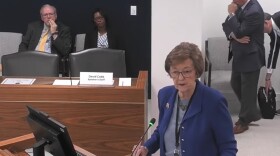After spending a month dragging their feet on the state budget, lawmakers are now in a 48-hour race to wrap it up and go home. The $21.1 billion budget before them is a hefty 260-page document filled with hundreds of edits, figures and calculations. But for many Republican lawmakers, including Sen. Harry Brown (R-Onslow), one item stands out.
“The priority of this session was education and, in particular, teacher pay,” Brown said.
Brown and others have touted the pay raise as an average seven percent increase. But it’s more complicated than that. Teachers early in their careers could see bumps of up to 18 percent, while some veteran teachers could get less than a one percent raise.
But Brown didn’t get into that when he presented the bill in front of Senators on Thursday. Instead, he went on to praise other parts of the budget.
“Under health and human services, this budget does not reduce eligibility for Medicaid and it does not eliminate school nurse positions,” he said.
Other provisions include $5 million additional dollars for pre-kindergarten and $1,000 raises for most state employees.
The bill would also move the State Bureau of Investigation under the purview of Gov. Pat McCrory. Right now, it’s under the control of Democratic Attorney General Roy Cooper.
But much of the debate on the Senate floor was focused on education. The raises will cost the state more than $280 million, which means lawmakers will have to rely on savings, while tightening up other areas. Many government agencies are being asked to make cuts that range from one to three percent.
The plan also reduces the state rates that will be paid to Medicaid providers by one percent.
“Hospitals are seeing more patients, but y’all are reimbursing them less for each patient," said Sen. Josh Stein (D-Wake). "They lose money every time they see a Medicaid patient, and now they’re going to lose even more money when they see a Medicaid patient.”
Other Democrats on the senate floor took turns attacking the budget.
“We’re increasing tuition once again, you say,’ it’s not that much this year’, but look what you’ve done over the years,” complained Sen. Floyd McKissick (D-Durham).
Under the bill, tuition for resident students at community colleges will increase by a maximum of $32 per year, from $2,288 to $2,320.
The budget also changes the income eligibility to qualify for child care subsidies.
“We know that there will be 7,200 families that will no longer qualify for those child care subsidies,” McKissick said.
Democratic lawmakers aren’t the only ones who are upset about the budget plan. Before Senators voted on Thursday, a group of protesters made their way through the legislative building. They dropped off several large cardboard boxes filled with thousands of signatures that ask lawmakers to repeal tax cuts.
“The reckless tax cuts, which benefit primarily the wealthy, haven’t been talked about enough,” said Gerrick Brenner, executive director of Progress North Carolina Action. “A budget is not just a function of what you want to spend, but it’s what you took in, which is a reflection of what you tax.”
The tax cuts are projected to cost the state $680 million, which is about $200 million more than what was expected, according to an analysis by General Assembly staff. Critics like Brenner argue that money could have gone to better use, such as public schools.
But Republican lawmakers, like Senate leader Phil Berger (R-Eden), say that their budget deal is sound and fiscally responsible.
“We are committed to making our public schools the best in the nation, and part of that is paying our teachers more and we’re doing that,” Berger said. “And we’re doing that with a substantial investment of the money that comes from the people back into education.”
The Senate voted on the bill Thursday. The House is now expected to take it up on Friday and likely Saturday morning before they pack up their things and head back home for a short break.
Below are some of the budget highlights:
- Teachers will get raises that average seven percent; teachers early in their careers could see raises up to 18 percent, while some veteran teachers could receive less than 1 percent
- $1000 raise for most rank-and-file state workers; $500 raise for central office personnel at public schools and other non-certified staff, including bus drivers and cafeteria workers
- Continues extra pay for teachers with master’s degrees and those who began work toward an advanced degree by Aug. 1, 2013. That does not apply to teachers who plan to get their master's degrees in the future.
- Allocates $840,000 to the private school voucher program to support 400 more semester-long scholarships
- Directs the State Board of Education to authorize the operation of two virtual charter schools
- Sets aside about $41 million to decrease class size in kindergarten and first-grades
- Imposes a $76 million flexibility cut to the UNC System
- Reduces the rates that will be paid to Medicaid providers by 1 percent
- Changes eligibility for child care subsidies. Families at 200 percent of the federal poverty level rather than 75 percent of the state’s median income would be eligible for child care subsidies under the budget.
- Transfers the State Bureau of Investigation from the Department of Justice, overseen by the attorney general, to the Department of Public Safety, a law enforcement division overseen by the governor.










